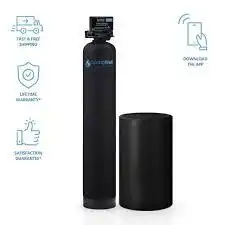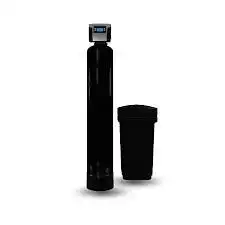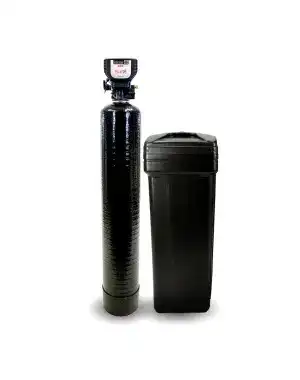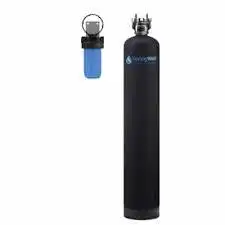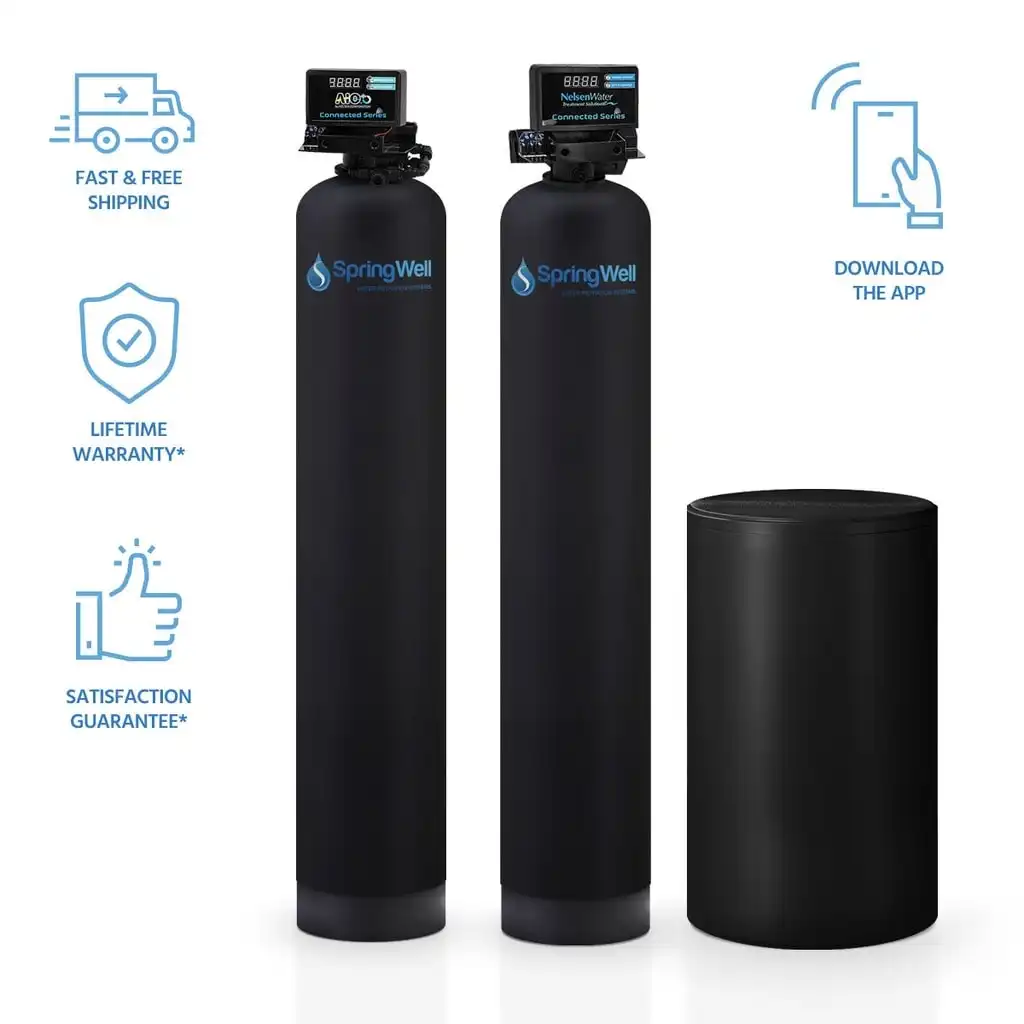Here is one you should know about water softeners:
“You won’t feel its absence if you’ve never used it, but once you do, you’ll never want to live without it.”
Choosing the right water softener for your well water comes down to a few considerations: the grain capacity, flow rate, type (read: salt-free or salt-based), and lifetime cost ( maintenance cost and initial price).
TL;DR – Here is how our top three water softeners compared according to the parameters above:
|
|
|
|
|
$$
|
$$
|
$
|
|
Editor's Note:
Effective in removing whatever hardness you can throw at it. Its also fairly priced and stupidly easy to install. Did I mention their exceptional customer service?
|
Editor's Note:
Not only is this softener one of the cheapest on the list but also one of the most efficient. The only reason why its not #1 is because it doesn't come with an mobile app like its peers.
|
Editor's Note:
If you're absolutely tight on budget but want a softener you can count on, then this might be it. Unlike others in this list, it also comes with 1 & 3/4 inch connection.
|
In the buyer’s guide section of this article, we’ll discuss, in detail, the following 10 considerations that might affect the kind of water softener you might need:
1. Water hardness: Anything above 10 GPG (170 mg/l) will require a water softener. What if your water hardness is lower, do you still need a water softener?
2. Grain capacity: What softener grain capacity should I choose? Will this affect my water pressure?
3. Water flow rate: What do I need to know about buying the right water softener with a sufficient flow rate?
4. Water filtration: Remember that water softeners don’t filter water but only remove calcium and magnesium ions. Will you need additional filtration systems?
5. Salt-based or salt-free: When should I use a water conditioner rather than a water softener?
6. Maintenance: What’s the maintenance requirement of a water softener?
7. Plumbing: Do you have a loop already installed in your plumbing? Should I hire a plumber to install it?
8. Regeneration: How often would the system need to be regenerated? Will it be automated or manual? How often will I need to recharge the salt and how much?
8. Budget: Should you buy a $10k Rain Soft system or will <$1k water softener you can find at Lowes do the job as well?
10. Installation: Should you self-install or call your local plumber? How much space do you need?
- #1. SpringWell SS Salt Based Water Softener System
- #2. Also Great: SoftPro Elite Water Softener
- #3. Budget Pick: Flexx Pro Series Smart Metered Water Softener
- #4. Salt-free Alternative: FutureSoft® Salt-Free Water Softener Alternative
- #5. Best For Iron: Water Filter and Salt Based Water Softener System
- Buyer’s guide: 10 things to consider
- Homeowners also asked these questions
Our Tailored Pick
#1. SpringWell SS Salt Based Water Softener System
The SpringWell SS Salt-Based Water Softener System stands out as the best overall choice. It’s priced reasonably. It offers top-notch performance and efficiency. With easy DIY installation, it’s perfect for both beginners and those replacing old systems. The app provides real-time performance insights, while exceptional customer support is like no other. It efficiently uses salt, has a power backup, and can be installed outdoors. It strikes the perfect balance between price, performance, and simplicity, making it the ideal choice for all water-softening needs.
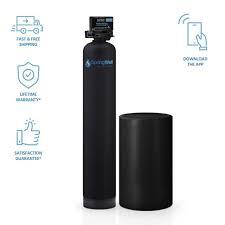
Things to consider:
- Price: $$
- Annual costs: $100 – $150 per year
- Type: Salt-based
- Grain capacity: 32k – 64k
- Flow rate: 11, 13 & 20 GPM
- Regen cycle: Time-based
- Regen process/flow regen: downward
- Resin type: 10%
- Preloaded resin: Yes
- Hardness: >50 GPG
- Connection size: 1’’
- Power backup: Yes
- Max pressure: 80 psi
- Warranty: Lifetime
Gallery
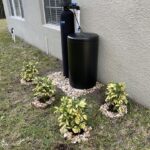
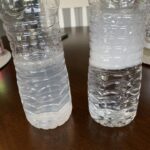
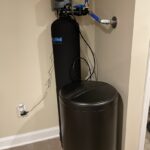
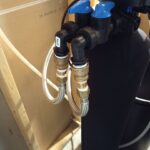
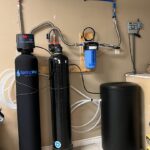
PROS:
- Low salt indicator/alert
- Power backup
- Support is knowledgeable and responsive
- Uses considerably less salt
- No need for a plumber, installation is easy
- Can be installed outside
- Upflow regen system, more efficient
CONS:
- For smaller spaces, the brine tank might be a little wider
- If you’re not using a 1” line, you’ll need to adapt to your line size
- Make sure the tank is sitting upright before connecting
- You might have to add water to the brine tank for the first manual regeneration
Why this softener?
Maybe you’re in the process of replacing your 15-year-old cull system, your know-how is a little rusty, or are just getting your first-ever water softener, but your know-how is still greeny. In either case, you want a system that doesn’t add unnecessary complexity.
I have found SpringWell’s water softener system to be a nice balance between price, performance, and complexity. Balance I don’t mean compromise but the best of both worlds.
First, it’s priced at half the cost of premium softeners like Culligan or RainSoft but performs just as well, if not better. It’s efficient and uses less salt. It’s stupidly easy to install, no need to call a plumber. The Bluetooth/mobile app-connected electronic head is a cool upgrade over your run-of-the-mill models out there.
If you struggle along the way, the customer support is like no other, they’re top-notch. They’ll walk you through any issues you might have.
Who is it for?
For newbies to water softeners, to get this system up and running, the only thing you’ll have to muster is the courage to cut some pipes. Instructions are really clear and honestly don’t need to pay a plumber $300 – $500 for installation.
For you fellas with a 15-year-old system on its last leg, you might actually have more trouble removing your old system than installing this one.
For techies, if you want to know how your system is performing at any given moment (daily usage, peak flow rate, soft water remaining, low salt alert, battery level, and more) it’ll be right within the palm of your hands using a mobile app to connect and control your water softener.
Can this SpringWell salt-based water softener remove Iron?
No, it cannot. Softeners cannot filter anything other than removing hardness from the water. If you also have an iron problem in your well water, you’d have to use their softener/filter combo (pick #5) that removes contaminants like iron (up to 7PPM), manganese (up to 1PPM), and hydrogen sulfide (up to 8PPM).
When should I use a salt-free water softener?
Salt-free water softeners are not very effective when your water hardness is high. How high? Anything above 7 GPG or 120 PPM is not gonna work with salt-free water softeners.
For more details, go here for further learning.
#2. SoftPro Elite Water Softener
For a good balance between performance and efficiency, this softener is hard to beat. Whatever hardness you have, it shouldn't be an issue for this softener. It's probably also the easiest to install amongst all the softeners in this list, all thanks to the push-to-connect fittings it comes with. SoftPro Elite doesn't just deliver on performance and ease of use, its also easy on your pocket. The estimated annual running costs are between $50 and $100 bucks per year.
Price: $$
Annual costs: $50 - $100
Type: Salt-based
Grain capacity: 24k - 80k
Flow rate: 6 - 11 GPM
Regen cycle: Time-based
Flow regen: downflow
Resin type: Fine mesh
Preloaded resin: Yes
Hardness:
Connection size: 1’’
Battery backup: Yes
Max pressure: 80 psi
Warranty: 10 & 7 years
Guarantee: 6 months or full refund
Certification: NSF, ANSI, IAPMO
Things to consider:
- Price: $$
- Annual costs: $50 – $100
- Type: Salt-based
- Grain capacity: 24k – 80k
- Flow rate: 6 – 11 GPM
- Regen cycle: Time-based
- Flow regen: downflow
- Resin type: Fine mesh
- Preloaded resin: Yes
- Hardness:
- Connection size: 1’’
- Battery backup: Yes
- Max pressure: 80 psi
- Warranty: 10 & 7 years
- Guarantee: 6 months or full refund
- Certification: NSF, ANSI, IAPMO
Why this softener?
The SoftPro Elite is well made and shouldn’t have issues with removing hardness from the water, so in other words, it does what it is supposed to do and does it well. Whatever level of hardness you can throw at it, it sure will handle.
Installation is such a breeze with push-to-connect fittings. Unless you don’t have a bypass loop already connected in your garage or basement, you really don’t need a plumber to help you with the installation.
SoftPro Elite doesn’t just deliver on performance; it’s also a savvy choice for your pocket. It’s saving salt like you would not believe. The estimated annual running costs are between $50 and $100 bucks per year.
PROS:
- Preloaded media
- Push to connect fittings and easy installation
- Support is always ready to take your call
- Reasonably priced
- Can be installed outdoors
- Smart clean for bacteria
- Power backup
CONS:
- Setting and programming the electronic head can be clearer
- No mobile app
- No alert for low salt level
- You might need a shark bite connector from PVC to Pex
Who is it for?
If water hardness is your only and biggest concern, and you’re looking for an upgrade from your old system or buying your first-ever water softener, then this system won’t disappoint.
It works and can remove the hardness from your water. It’s easy to set up and operate. If you run into some issues, customer support is always willing to jump in and help.
Can this system remove Iron?
SoftPro Elite system is a softener that, in and of itself, cannot remove iron but there is an upgrade package that includes a Pro Iron Master filter upgrade which can remove up to 30 PPM but that will cost you an extra $1,000 bucks if you have iron water problem.
The Pro Iron upgrade can also remove sulfur, manganese, and hydrogen sulfide (rotten egg smell).
I have acidic water, can this system help?
If paired with a pH buster, you can be able to increase and correct problems with acidic water. Any well water with pH less than 6.5, might be too acidic.
What type of salt should I add?
Pellets or coarse crystals of salt, sodium chloride (NaCl), and also potassium chloride can be used.
#3. Flexx Pro Series Smart Metered Water Softener
The Flexx Pro Series Smart Metered Water Softener, our budget-friendly pick, offers the convenience of Bluetooth connectivity for easy status checks. It's a versatile system capable of tackling high water hardness levels, even up to 50 GPG, with ease. Installation is simplified with options for ¾ and 1-inch connection sizes, and it provides operational flexibility, allowing control via a mobile app or onboard buttons.
Price: $
Annual costs: $50 - $100
Type: Salt-based
Grain capacity: 15k - 38k
Flow rate: 7- 20 GPM
Regen cycle: Time-based
Regen process/flow regen: downward
Resin type: 8%
Preloaded resin: No
Max pressure: 100 psi
Hardness: >50 GPG
Connection size: 1’’ & ¾”
Power backup: Yes
Warranty: 10 & 7 years
Guarantee: 1 year
Things to consider:
- Price: $
- Annual costs:
- Type: Salt-based
- Grain capacity: 15k – 38k
- Flow rate: 7- 20 GPM
- Regen cycle: Time-based
- Regen process/flow regen: downward
- Resin type: 8%
- Preloaded resin: No
- Max pressure: 100 psi
- Hardness:
- Connection size: 1’’ & ¾”
- Power backup:
- Warranty: 10 & 7 years
- Guarantee: 1 year
Why this softener?
The Flexx Pro Series Smart Metered Water Softener offers a budget-friendly solution with some notable features. The Bluetooth feature is a nice touch, you don’t have to go into your crawlspace to check your softener status.
One of its strengths is that whatever water hardness you can throw at it, it’ll probably be able to handle. 50 GPC water hardness? No problem. This softener can handle it with ease. Plus, its availability in ¾ and 1-inch connection sizes simplifies the installation process, ensuring compatibility with your existing system.
In terms of operation, you have the flexibility to control it through the mobile app or using the onboard buttons, catering to different preferences.
PROS:
- Option to use the mobile app or onboard buttons
- Comes with resin cleaner to extend its lifespan
- Little cheaper than most softeners
- Comes in ¾ and 1-inch connection size
CONS:
- The resin is not preloaded
- No alert for low salt level
- Can’t be installed outdoor
- Make sure the tank is sitting upright before connecting
- You might have to add water to the brine tank for the first manual regeneration
Who is it for?
The Flexx Pro Series Smart Metered Water Softener is an ideal choice for those seeking an economical solution without compromising essential features. While big-box store models may appear cheaper, they often come with a host of issues. If you value reliability and convenience without breaking the bank, this budget pick is worth considering.
Can this softener system handle chlorinated water?
Any chlorine or chloramine above 2 PPM could reduce the lifespan of the resin. You’d need to reduce chlorine with a whole house water system or chlorine-reducing media before you soften the water.
#4. FutureSoft® Salt-Free Water Softener Alternative
Salt-free water softeners have their advantages over salt-based softeners. One such is that, unlike salt-based softeners, they don’t waste water. So if you’re on a low-producing well and can't afford to waste water on backflush, then you might need this system.
Price: $$
Operational costs: $50 - $80 per year
Type: Salt-free
Grain capacity: 32k - 64k
Flow rate: 12 - 20 GPM
Regen cycle: N/A
Regen process/flow regen: N/A
Media type: Futuresoft
Preloaded media: Yes
Hardness:
Connection size: 1’’
Power backup: No
Max pressure: 80 psi
Warranty: 10 & 5 years
Guarantee: 6 months
Things to consider:
- Price: $$
- Operational costs: $50 – $80 per year
- Type: Salt-free
- Grain capacity: 32k – 64k
- Flow rate: 12 – 20 GPM
- Regen cycle: N/A
- Regen process/flow regen: N/A
- Media type: Futuresoft
- Preloaded media: Yes
- Hardness:
- Connection size: 1’’
- Power backup: No
- Max pressure: 80 psi
- Warranty: 10 & 5 years
- Guarantee: 6 months
Why this softener?
Salt-free water softeners have their advantages over salt-based softeners. One such is that, unlike salt-based softeners, they don’t waste water. So if you’re on a low-producing well and can’t afford to waste water on backflush, then you might need this system.
Or maybe you’re living in LA where salt-based water softeners are banned, then a salt-free is your best option.
PROS:
- Can be installed outside
- Can work in tight spaces
- No drop in water pressure
CONS:
- Very low maintenance
- Max hardness is 80 GPG
- Media is sensitive
- You’ll need, at minimum, a sediment filter before this softener
- The minerals can still create dusting on your dishes
Who is it for?
The FutureSoft Salt-Free Water Softener Alternative caters to those seeking a salt-free solution with specific needs. Due to its sensitivity to contaminants like iron, manganese, sulfur, and copper, even in low quantities, pre-filtration is important.
I would also recommend this solution if you’re dealing with moderately hard water (5 GPG – 10 GPG). This will ensure you can deal with the mineral buildup in your appliances while retaining water-taste-giving minerals in your water.
Additionally, if you have a low-producing well and need to conserve water without backflushing, this system would work well for your water treatment setup.
Will my water hardness change after salt-free softener?
Not it will not change. The salt-free water softener does not remove minerals like Calcium and Manganese in your water, it just neutralizes them to prevent them from forming scale on your appliances.
The difficulty with salt-free softeners is that the hardness is not altered and therefore you cannot measure the effectiveness. You can only observe the results.
#5. Water Filter and Salt Based Water Softener System
Whether it's a yellowish tint or rotten egg smell you want to remove, in addition to softening your water, this well filter and water softener is designed to remove iron, manganese, and sulfur in your well water. It's a great solution for homeowners dealing with iron and hardness problems in their water.
Price: $$$
Operational costs: $100 - $150 per year
Type: Salt-based
Grain capacity: 32k - 80k
Flow rate: 11, 13 & 20 GPM
Regen cycle: Time-based
Regen process/flow regen: downward
Resin type: 10%
Preloaded resin: Yes
Hardness: >50GPG
Connection size: 1’’
Power backup: Yes
Max pressure: 80 psi
Warranty: Lifetime
Things to consider:
- Price: $$$
- Operational costs: $100 – $150 per year
- Type: Salt-based
- Grain capacity: 32k – 80k
- Flow rate: 11, 13 & 20 GPM
- Regen cycle: Time-based
- Regen process/flow regen: downward
- Resin type: 10%
- Preloaded resin: Yes
- Hardness:
- Connection size: 1’’
- Power backup: Yes
- Max pressure: 80 psi
- Warranty: Lifetime
Why this softener?
Do you have a smell (rotten egg or wet dog smell) and taste problems in your well water, in addition to hard water?
The well filter and softener combo can help you remove any unwanted particulates (iron, sulfur, and manganese) in addition to softening your water.
PROS:
- Removes iron up to 3 PPM
- Easy to install and maintain
- Support is knowledgeable and responsive
- Uses considerably less salt
CONS:
- It does not remove all TDS
- You might need an adapter for 1” line
Who is it for?
If you have some iron (limit is 0.3 mg/l), sulfur, or magnesium in your water, you’ll need another filter to remove these particulates.
This system has only been tested on the above three contaminants, so if you have any other contaminants, like bacteria for example, this system will not work for you.
There are a few things to consider when choosing the right water softener, here are some of the big ones we’ll cover in this article:
Buyer’s guide: 10 things to consider
Water hardness
More than 85% of the country’s water is hard water. The good news is that hard water is not bad for your health but certainly bad for your appliances, pipes, clothes, and even hair.
Anything above 10 GPG or 170 mg/l is very hard water and will be readily noticeable with limescale buildup. At this level of hardness, you’ll certainly need a water softener, a salt-based water softener at that.
Moderately hard water (5 GPG (75 mg/l) – 10 GPG), on the other end, is sometimes preferable.
This is because of the mineral content that gives the water its taste. In this range, I wouldn’t recommend a water softener unless if you notice either of scale buildup on your fixtures or dingy and faded clothes and tangled hair, then in that case you could benefit from softened water. Be sure to have a bypass line for your drinking and cooking water.
Grain capacity
Remember that hardness can be measured in grains per gallon (GPG), so the grain capacity of a water softener is a measurement of how many grains a water softener can remove before it needs to be recharged or regenerated.
I will spare the math and funny formulas, here is something little more relatable. Assuming a regeneration every 7 days, here is the grain capacity you’ll need for different family sizes:
- Family of two: 10k to 22k gain capacity will do
- Family of two to four: 22k to 32k gain capacity
- Family of four to six: 32k to 42k grain capacity
- More than six family members, go for at least 42k grain capacity
The softeners recommended above all come with different options for grain capacity you can choose on their product pages.
Flow rate (GPM)
As your grain capacity requirement increases, so does the minimum peak flow rate necessary to maintain optimal water delivery.
For instance, a household with two bathrooms should have a minimum flow rate of 8 gallons per minute (GPM). Given that a standard showerhead uses between 2-3 GPM, it’s important to ensure that even with both showers running simultaneously, you can still achieve sufficient water flow for both, with a bit of extra capacity to spare.
- 1-3 Bathroom Unit – 8 to 13 GPM
- 4-6 Bathroom Unit – 13 to 20 GPM
- 7+ Bathroom Unit – > 20 GPM
Before proceeding further in your research, always make sure you know your grain capacity and flow rate requirements.
Water filtration
The important thing to remember with water softeners is that they don’t filter your water, rather they just remove hardness (calcium and manganese ions) from your water.
If you have other contaminants in your well water above EPA limits, for example iron, you’ll need to add a filtration system to remove those contaminants.
In the case of iron, the EPA limit is 0.3 mg/l, so if your iron concentration is above this, then you’ll need filter/softener combo to deal with both hardness and iron.
Salt-based or salt-free
Unlike soft water, hard water minerals give your water the nice taste it has. So moderately hard water is not bad at all. However, if these minerals lead to scale buildup in your appliances, getting a water conditioner can be a sensible choice.
Unlike water softeners, water conditioner neutralizes rather than remove calcium and magnesium ions. So the minerals will still be in your water but won’t cause scaling.
For any hardness above 7 GPG, go for a salt-based water softener. This is the most effective solution but for moderately hard water (75 mg/l – 120 mg/l), a salt-free water conditioner might be best.
Regeneration
A softener regen cycle may be on a timer or usage cycle. For a timer, this can typically be 7 or 14 days. The choice between these intervals depends on the capacity of your softener, which is determined by its grain capacity.
Usage-based regeneration is more adaptive. The monitor constantly checks water usage and initiates the regeneration process when the resin bed approaches saturation.
The regeneration period is included with the user manual or installation guide so no need to perform any calculations to determine how often you’ll need to regenerate your system.
Budget
There is no reason why you should pay more than $2000 bucks for a water softener system unless you’re adding filtration like a sediment filter or whole house filter in addition.
I have seen folks getting quoted $3000+ which is totally absurd.
If you can put together a Lego set, you can surely install a water softener with little learning and time. This can save you a lot on labor costs.
There are some softeners, like AO Smith from Lowes or Rheel from Home Depot that cost as low as $399. I haven’t recommended them due to certain persistent issues. For instance, the Rheel water softener has experienced problems like its tank neck breaking and causing flooding. Another concern is the frequency of regeneration and the high water usage associated with it during the regeneration process.
A sweet spot in terms of budget is anywhere between $700 and $2000. Anything above, you’re getting ripped off, and anything below, you might have issues later.
Plumbing
Some people can tell a difference in taste between soft and hard water, I am one of them.
If you’re like me, and you prefer hard water with some minerals in it, then you might want to install a bypass loop that skips softening and goes straight to the kitchen for drinking, cooking, and watering your plants.
If you don’t already have this bypass line, it should be easy enough for a plumber but you’ll have to pay for that. Or you can do it yourself if you don’t mind getting your hands dirty.
The same thing goes for hooking up your water softener system. If you’re the hands-on type and like DIY, it shouldn’t take you the whole day to install your water softener. But if DIY is not your thing, you’re better off using a plumber.
Installation & Maintenance
For most water softeners, you’ll need to replenish with salt every 1 – 3 months. You can get a bag of 40lb salt at Costco, Walmart, Lowes, or any of the big box stores for about $20 bucks.
The resin bed should last you for more than 10 years or longer, easily. You might want to clean out the brine tank every so often, maybe once a year, to remove salt buildup.
Homeowners also asked these questions
Do I need to re-test my water after installing a water softener?
Yes do retest your well water to see if water hardness is still present or not. This is only possible with salt-based softeners. Remember that salt-free softeners do not remove hardness but simply neutralize hardness minerals so they don’t cause damage to your appliances.
When do I need to pre-filtrate the water before using a water softener?
The presence of other contaminants (iron, bacteria, nitrite/nitrate, etc.) in concentrations above EPA limits will need to be pretreated separately.
For example, if you also have an iron problem in your well water, then rather than getting the SpringWell salt-based filter alone, you might also need to add a whole-house filter to deal with iron and other contaminants.
How do I fill or refill the brine tank with salt?
Fill the salt to about two inches below the top of the safety float tube in the tank. Use the salt completely before refilling, do not top off the salt. How do you know if it’s used? When you can start seeing water on top of salt, then you can refill.
When is the best time for regeneration?
The regeneration cycle can last up to 2 hours. During this time, the softener is automatically bypassed and therefore hard water is going into your home. Because of this, this should be scheduled at the time when water is not used or least used, particularly hot water. This is normally at night, 12 AM, 2 AM, etc., for most families but for yours, it might be different.
